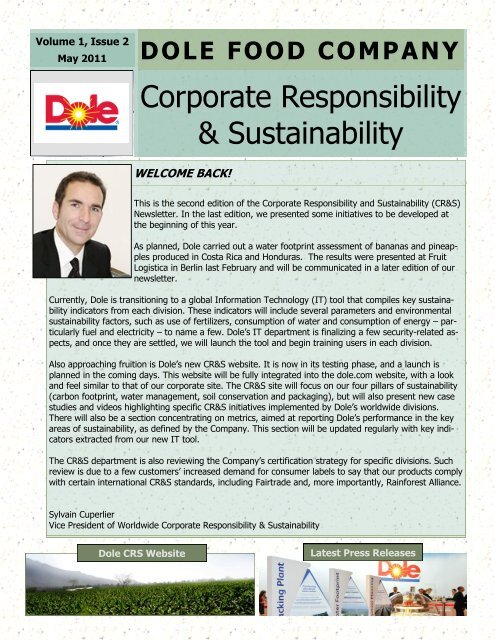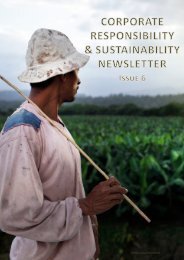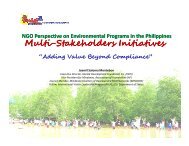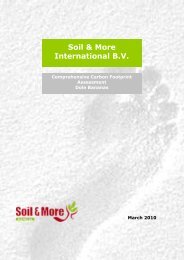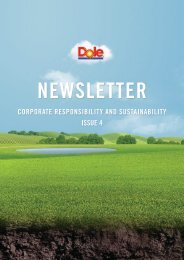Archive: Issue 2 - Dole Sustainability
Archive: Issue 2 - Dole Sustainability
Archive: Issue 2 - Dole Sustainability
Create successful ePaper yourself
Turn your PDF publications into a flip-book with our unique Google optimized e-Paper software.
Volume 1, <strong>Issue</strong> 2<br />
May 2011<br />
DOLE FOOD COMPANY<br />
Corporate Responsibility<br />
WELCOME BACK!<br />
& <strong>Sustainability</strong><br />
This is the second edition of the Corporate Responsibility and <strong>Sustainability</strong> (CR&S)<br />
Newsletter. In the last edition, we presented some initiatives to be developed at<br />
the beginning of this year.<br />
As planned, <strong>Dole</strong> carried out a water footprint assessment of bananas and pineapples<br />
produced in Costa Rica and Honduras. The results were presented at Fruit<br />
Logistica in Berlin last February and will be communicated in a later edition of our<br />
newsletter.<br />
Currently, <strong>Dole</strong> is transitioning to a global Information Technology (IT) tool that compiles key sustainability<br />
indicators from each division. These indicators will include several parameters and environmental<br />
sustainability factors, such as use of fertilizers, consumption of water and consumption of energy – particularly<br />
fuel and electricity – to name a few. <strong>Dole</strong>’s IT department is finalizing a few security-related aspects,<br />
and once they are settled, we will launch the tool and begin training users in each division.<br />
Also approaching fruition is <strong>Dole</strong>’s new CR&S website. It is now in its testing phase, and a launch is<br />
planned in the coming days. This website will be fully integrated into the dole.com website, with a look<br />
and feel similar to that of our corporate site. The CR&S site will focus on our four pillars of sustainability<br />
(carbon footprint, water management, soil conservation and packaging), but will also present new case<br />
studies and videos highlighting specific CR&S initiatives implemented by <strong>Dole</strong>’s worldwide divisions.<br />
There will also be a section concentrating on metrics, aimed at reporting <strong>Dole</strong>’s performance in the key<br />
areas of sustainability, as defined by the Company. This section will be updated regularly with key indicators<br />
extracted from our new IT tool.<br />
The CR&S department is also reviewing the Company’s certification strategy for specific divisions. Such<br />
review is due to a few customers’ increased demand for consumer labels to say that our products comply<br />
with certain international CR&S standards, including Fairtrade and, more importantly, Rainforest Alliance.<br />
Sylvain Cuperlier<br />
Vice President of Worldwide Corporate Responsibility & <strong>Sustainability</strong><br />
<strong>Dole</strong> CRS Website Latest Press Releases<br />
1
What’s New?<br />
DOLE AND MEDSHARE PARTNER TO DELIVER MEDICAL SUPPLIES TO<br />
LATIN AMERICAN COMMUNITIES<br />
Last December, <strong>Dole</strong> shipped its sixth 40-foot container of<br />
medical equipment for needy communities in South and<br />
Central America.<br />
The supplies includes ultrasound equipment, hospital beds,<br />
centrifuges and generators, and smaller implements such as<br />
crutches, walkers, needles, gauze, syringes and surgical<br />
drapes. It was all provided by the nonprofit organization<br />
MedShare and shipped free of charge from <strong>Dole</strong> ports in the<br />
United States via <strong>Dole</strong> Ocean Cargo Express. The containers<br />
are delivered to municipal governments and nonprofit organizations<br />
that run small public-health clinics in Ecuador and<br />
Honduras.<br />
COORDINATING MEDICAL MISSION TO THE PHILIPPINES<br />
At the beginning of the year, <strong>Dole</strong>fil hosted the latest of three medical missions to the Philippines.<br />
Coordinated in partnership with the Philippine Medical<br />
Society of Florida, Mahintana Foundation and the Mt.<br />
Matutum Health Care Foundation, the week-long<br />
mission was led by a team of 10 doctors and six<br />
nurses. Together, they provided medical and surgical<br />
care to residents of the provinces of South Cotabato,<br />
Sarangani and in General Santos City, Philippines.<br />
The <strong>Dole</strong>fil missions have evolved to not only provide<br />
medical care in the Philippines, but to coordinate the<br />
treatment of patients with more complex needs in the<br />
United States.<br />
Supplies for the mission were transported for delivery by <strong>Dole</strong>fil container vans ahead of the<br />
medical team along with hospital equipment being donated to public hospitals in the province.<br />
2
PHILIPPINE DEPARTMENT OF LABOR AND EMPLOYMENT ANNOUNCES<br />
OFFICIAL RESULTS OF DOLEFIL TRADE UNION CERTIFICATION ELECTION<br />
On March 1, 2011 the Department of Labor and Employment of the<br />
Philippines proclaimed the results of the February 22, 2011 trade<br />
union Certification Election held at <strong>Dole</strong>fil.<br />
Over 97% of <strong>Dole</strong>fil’s 3,876 registered voters participated in the secret<br />
ballot election. Of these voters, 75% decided to elect LEAD.PH<br />
as the new union. Meanwhile, AK-<br />
NAFLU-KMU, which had represented<br />
<strong>Dole</strong>fil’s workers since 2001 and was<br />
supported by some internationally<br />
campaigning organizations, received<br />
less than 25% of the votes.<br />
On the basis of the election results,<br />
LEAD.PH was certified by the Department of Labor and Employment<br />
as the sole and exclusive bargaining agent.<br />
This Certification Election gives a clear answer to a long intra-union<br />
dispute between the two groups regarding legitimacy for workers’<br />
representation.<br />
THIS JUST IN…<br />
What’s New?<br />
WITHIN DAYS OF THE HORRIFIC TSUNAMI AND EARTH-<br />
QUAKE THAT LEFT MOST OF JAPAN IN RUINS, DOLE<br />
JAPAN DONATED 10 MILLION YEN (US $118,000) TO<br />
THE JAPANESE RED CROSS SOCIETY TO ASSIST WITH<br />
THOSE IMPACTED BY THE NATURAL DISASTER.<br />
3
Additional Exposure<br />
The following news is extracted from press releases issued by <strong>Dole</strong>. Full press releases are available at www.dole.com<br />
DOLE EUROPE LAUNCHES INFORMATIONAL CAMPAIGN ON DOLE<br />
SUSTAINABILITLY PRACTICES IN PINEAPPLE PRODUCTION<br />
Messages on <strong>Dole</strong>’s pineapple hang tags now prompt European consumers to visit www.dolenews.com<br />
(available in Dutch, English, French and<br />
German) to discover the company’s best practices for<br />
sustainability in pineapple production in Costa Rica.<br />
Several initiatives will be presented on a rolling basis<br />
throughout 2011. This first round of information leverages<br />
photos and videos to present <strong>Dole</strong>’s forest<br />
conservation and biodiversity protection initiatives.<br />
Furthermore, the website contains general information<br />
on pineapple production and presents the<br />
<strong>Dole</strong> farms in which our Costa Rican pineapples are<br />
cultivated.<br />
PRESENTING WATER INITIATIVE AT FRUIT LOGISTICA<br />
<strong>Dole</strong> has participated in the Fruit Logistica each year since its inception in 1993, and this year was<br />
no different. For the 2011 fair, held in Berlin, Germany, <strong>Dole</strong><br />
Europe highlighted the Company’s dedication to water conservation<br />
by presenting its various best practices that reduce water<br />
footprint. The <strong>Dole</strong> stand focused on four areas of water<br />
efficiency:<br />
1. Maximization of rain water use.<br />
2. Implementation of progressive irrigation techniques.<br />
3. Optimization of water use during the packing process –<br />
<strong>Dole</strong>’s “New Millennium Packing Plant” was shown as an<br />
example.<br />
4. Special attention to the quality of water returned that is<br />
returned to water bodies.<br />
Roberto Vega, Director of <strong>Sustainability</strong> at <strong>Dole</strong>, presented<br />
these initiatives at the “Water – Making the Most of a Limited<br />
Resource” conference.<br />
4
Additional Exposure<br />
DOLE PARTICIPATES IN THE GLOBAL SOCIAL<br />
COMPLIANCE PROGRAM MEETING IN BRUSSELS<br />
On April 14, <strong>Dole</strong> participated in a meeting for the Global Social Compliance<br />
Program (GSCP), which is the largest coalition of retailers in the<br />
world. In addition to <strong>Dole</strong>, the GSCP’s member roster includes Walmart, Carrefour, Tesco, Ahold,<br />
Marks & Spencer, Migros, Delhaize, Auchan, Casino, Woolworths Australia and many other global<br />
corporations. In this meeting, GSCP presented their approach to verifying that suppliers' comply<br />
with core labor and social standards.<br />
First, the initiative defined a Reference Code – a code that<br />
addresses all labor items to be checked in the supply chain.<br />
This Reference Code is not a new certification, but rather a<br />
check list that will be used during the evaluation.<br />
Now, the initiative will rely on existing standards in order to<br />
assess suppliers' performance against the Reference Code.<br />
Each listed item will be compared to existing standards in<br />
order to determine if the standard exceeds, fully complies<br />
with, partly complies with or does not cover the item. Full<br />
compliance of a standard with the Reference Code will NOT<br />
be required.<br />
The primary goal of this new process is to avoid duplicating<br />
audits according to different labor standards. Over time,<br />
however, a similar assessment procedure will be applied to environmental requirements.<br />
Organizations that set such standards will be able to send their applications for the benchmarking<br />
process in May. Ahold already announced that they plan to evaluate all of their suppliers against<br />
the Reference Code by the end of 2012.<br />
ADDITIONAL AGREEMENT SIGNED WITH COSTA RICAN UNIONS<br />
Prompted by representatives from Bama (a Norwegian <strong>Dole</strong> customer), LO (Norwegian trade unions)<br />
and HSH (the Norwegian employers’ organization), Standard Fruit de Costa Rica reached an<br />
agreement with COSIBA, the Coordination of Banana Unions in Costa Rica. Finalized this past February,<br />
the agreement states that workers are to be trained by some representatives of the International<br />
Labor Organization (ILO) in two farms. The training will focus on the ILO principles and<br />
will be sponsored by the Norwegian government.<br />
5
Additional Exposure<br />
WORLD BANANA FORUM<br />
In November 2010, <strong>Dole</strong> participated in several meetings organized by the<br />
World Banana Forum (WBF).<br />
The Forum’s Working Group on Sustainable Production Systems and<br />
Environmental Impact has created two sub-committees: one focusing on<br />
agro-chemical usage (environmental impact only) and the other focusing<br />
on the development of an internet-based library aimed at exchanging best practices for sustainable<br />
banana production. In January, Standard Fruit de Costa Rica received a delegation of representatives<br />
from UGPBAN (the Banana Producers in Martinique and Guadeloupe) and CIRAD (a<br />
French research institute) so that best practice information could be exchanged on the ground.<br />
The Latin team is planning to visit growers in the French West Indies to see which alternatives<br />
have been implemented after the European Union’s ban of aerial spraying.<br />
The Working Group on Distribution of Value is currently performing pilot audits to help develop a<br />
method for calculating decent wages in the banana sector.<br />
The Working Group on Labor Rights primarily addresses issues related to female workers and<br />
freedom of association. For the 100th anniversary of the International Women’s Day in May, several<br />
NGOs and advocacy groups wrote to the major bananas companies, including <strong>Dole</strong>, requesting<br />
that they pay special attention to women and address this issue within the WBF’s framework.<br />
PROMOTING SUSTAINABILITY PROGRAMS AMONG EURO CUSTOMERS<br />
Throughout March, the CR&S team had to opportunity to meet some of <strong>Dole</strong>’s<br />
key customers in Europe to enlighten them on the Company’s sustainability efforts.<br />
Those customers include Axfood, a Swedish company interested in<br />
adopting a consumer label such as Rainforest Alliance or Fairtrade and ICA, a<br />
new customer – also from Sweden – interested in funding a women empowerment<br />
program run by the Ecuador’s Dale Foundation. The CR&S team also met<br />
with Spar Austria’s CEO to discuss <strong>Dole</strong>’s reaction to the Bananas!* movie and<br />
the work carried-out by the co-funded Mobile Medical Unit in Costa Rica.<br />
The relationship has also been strengthened with Marks & Spencer (M&S) in<br />
the United Kingdom. Technical Manager at <strong>Dole</strong> Fresh U.K. David Alder was<br />
invited to present <strong>Dole</strong>’s water conservation initiatives at M&S’s annual “Plan<br />
A” conference. At this 1,200-person event, M&S delved into its new work on<br />
soil conservation, water management and pesticide use, among other topics.<br />
6
Additional Exposure<br />
DOLE SEEKS INITIATIVES TO IMPROVE THE IMAGE OF THE PINEAPPLE<br />
INDUSTRY IN COSTA RICA<br />
Following a rather negative newspaper report by The Guardian on pineapple production in Costa<br />
Rica, <strong>Dole</strong>’s CR&S department met with Consumers International, the London-based consumer<br />
organization that had commissioned the report.<br />
The goal of this meeting was to present <strong>Dole</strong>’s sustainability<br />
practices in pineapple production and look<br />
for opportunities to correct the image of Costa<br />
Rica’s pineapple industry. After <strong>Dole</strong> and Consumers<br />
International agreed that the industry itself should<br />
drive any such initiative, <strong>Dole</strong> offered to approach<br />
the Chamber of the Costa Rican Pineapple Producers<br />
and Exporters (CANAPEP), to get their views on<br />
this.<br />
In March, the same topic was discussed with<br />
CANAPEP, who is well-aware that action must be<br />
taken to improve the image of the Costa Rican pineapple<br />
industry, particularly in Europe. Despite such knowledge, their resources seem to be limited<br />
for such an initiative, so <strong>Dole</strong> may have to explore other options, such as working with Costa<br />
Rica’s newly launched sustainability council.<br />
SNAPSHOT<br />
SNAPSHOT<br />
SNAPSHOT<br />
In March, <strong>Dole</strong> Latin America President Jonathan Bass delivered a speech<br />
further highlighting <strong>Dole</strong>’s<br />
commitment to sustainability<br />
during a dinner of prestigious<br />
environmental advocates.<br />
Attendees included former U.S. Vice President and<br />
2007 Nobel Peace Prize recipient Al Gore, representatives<br />
of the Costa Rican government, and the<br />
U.S. Ambassador to Costa Rica. Bass’ remarks<br />
followed Vice President Gore's presentation on<br />
"sustainable economic development and the new<br />
global focus" represented the close of a day-long<br />
event.<br />
7
Do You Know...<br />
THE CARBON FOOTPRINT OF A DOLE BANANA?<br />
Carbon footprint: the sum of all greenhouse gas emissions (GHG) caused by a product life cycle.<br />
Scope<br />
The following assessment covers the carbon<br />
footprint of bananas that are produced on <strong>Dole</strong>owned<br />
banana<br />
plantations in<br />
Costa Rica and<br />
then distributed in<br />
German markets.<br />
The study defines<br />
the scope of a<br />
production chain<br />
as beginning with<br />
raw material and<br />
ending with the<br />
product at the retail<br />
shelf. It covers<br />
these four stages:<br />
1. Farming<br />
2. Packing (including inland transportation in<br />
Costa Rica)<br />
3. Shipping<br />
4. Ripening and Distribution<br />
Results<br />
The carbon footprint of<br />
<strong>Dole</strong> bananas is 1.124 kg<br />
CO2e (“e” for equivalent<br />
since all GHG are compared<br />
to CO2) per kilo of bananas.<br />
The majority of emissions<br />
are related to overseas<br />
transportation.<br />
Emissions related to fertilizer<br />
use have a significant<br />
impact on the total carbon<br />
footprint of <strong>Dole</strong> bananas.<br />
84.46, 8%<br />
26.62, 2%<br />
53.51, 5%<br />
691.74, 62%<br />
8<br />
Exclusions<br />
The following sources of emissions are NOT included<br />
in this carbon footprint study:<br />
User (consumer) phase of products, because<br />
it has a high level of uncertainty and<br />
the estimated emissions during the user<br />
phase on an eventual carbon footprint is<br />
usually minor.<br />
Waste/recycling phase due to its high level<br />
of uncertainty.<br />
Land use change is a major source of<br />
greenhouse gas emissions worldwide; however,<br />
because the methodology of how to<br />
allocate it to different products is still under<br />
development, it is excluded from this assessment.<br />
Emissions from the production of capital<br />
goods (trucks, airplanes and buildings).<br />
Traveling of employees to and from normal<br />
place of work.<br />
Transportation of consumers to and from<br />
retail.<br />
137.83, 12%<br />
Carbon Footprint Results<br />
89.6, 8%<br />
Total Carbon Footprint<br />
1.124 Ton CO 2 e/Ton Banana<br />
1.124 Kg CO 2 e/Kg Banana<br />
14.11, 1%<br />
25.75, 2%<br />
Farm<br />
Packaging<br />
Transport from packaging facility to terminal<br />
Terminal and port operations<br />
Overseas transport<br />
Ripening<br />
Transport from ripening facility to retail<br />
Extra due to exclusions (5%)<br />
20/05/2009<br />
4
Joemil Monteban,<br />
Executive Director of KDFI<br />
Who’s Who?<br />
JOEMIL MONTEBON: MAN IN MOTION<br />
Executive Director of Kasilak Development Foundation, Inc. (KDFI),<br />
Joemil Montebon is the man behind <strong>Dole</strong>-Stanfilco’s community programs<br />
that have enhanced the quality of life for <strong>Dole</strong> employees<br />
throughout the Mindanao region for over a decade.<br />
Established in March 3, 1997, KDFI is a non-profit social development<br />
organization whose goal is “to uplift the socio-economic condition of<br />
the communities living in a peaceful and ecologically balanced environment.”<br />
The foundation was first developed to manage the P 14M<br />
($320,000) Libuganon River Reforestation Project – benefitting 500<br />
farmers across 500 hectares in Davao del Norte. Because of the project’s<br />
success, KDFI began expanding its activities to other nearby areas,<br />
and today, it has become Stanfilco’s partner NGO in serving<br />
<strong>Dole</strong>’s areas of operations all over Mindanao.<br />
In the following interview, we catch up with Joemil to learn about KDFI’s contributions to <strong>Dole</strong>’s<br />
development and sustainability programs.<br />
<strong>Dole</strong>: What’s a typical<br />
day for KDFI’s Executive<br />
Director?<br />
JM: It’s almost always a day<br />
full of meetings. Kasilak is<br />
present in various provinces<br />
around Mindanao – usually<br />
where <strong>Dole</strong>’s banana farms<br />
are located – so I travel almost<br />
every week. I need to<br />
meet with the staff and institutional<br />
partners in order<br />
to monitor the progress of<br />
assigned tasks and projects.<br />
Traveling, in itself, requires<br />
at least a half-day’s time per<br />
trip. For example, if a meeting<br />
starts at nine o'clock in<br />
KDFI’s areas of operations span eight different provinces and six cities on the island of<br />
Mindanao, Philippines – an area of 47,643 km² (18,395 square miles).<br />
the morning, it entails waking up as early as 4am so I can head to the venue by 5am and make it<br />
to the appointment on time.<br />
9
<strong>Dole</strong>: How does KDFI operate?<br />
Who’s Who?<br />
JM: KDFI focuses on programs that cover environmental conservation and sustainable farming,<br />
livelihood assistance and income augmentation, basic social services, and organizational development.<br />
In most cases, these programs are conducted in the provinces of <strong>Dole</strong>-Stanfilco’s operations.<br />
In addition to its partnership with <strong>Dole</strong>-Stanfilco, Kasilak has<br />
built respectful, cooperative and strong partnerships with over<br />
a dozen institutions and government units (see table) – an<br />
area of importance for the foundation.<br />
<strong>Dole</strong>: What have you learned from your five years at<br />
KDFI and partnership with <strong>Dole</strong>? What was it like<br />
starting with KDFI?<br />
JM: I started working with Kasilak in 2005 as a Community<br />
Development Officer, assigned to one of <strong>Dole</strong>-Stanfilco’s<br />
zones. Although at the time I had 13 years of experience<br />
working with NGOs, it was only through KDFI that I was able<br />
to work directly with a corporate partner, <strong>Dole</strong>-Stanfilco. This<br />
has greatly widened my understanding and perspective of<br />
business’ role in social and community development.<br />
Since joining KDFI, I have witnessed the organization’s<br />
growth. Close to 20 projects, totaling P 580M ($13M), have<br />
been implemented and are already benefitting thousands of<br />
people in Mindanao.<br />
Contributing to Kasilak’s success is the continuous support,<br />
guidance and leadership from <strong>Dole</strong>-Stanfilco. The work values<br />
that <strong>Dole</strong>-Stanfilco’s management impart, specifically in the<br />
areas of stewardship, accountability, and quality control, have<br />
helped KDFI build a name within the NGO and donor communities.<br />
Additionally, witnessing <strong>Dole</strong>’s strong, genuine dedication to<br />
corporate responsibility and sustainability has deepened my<br />
personal commitment to responsible corporate citizenship.<br />
10<br />
KDFI’s Development Partners<br />
United States Agency for International<br />
Development (USAID)<br />
World Bank Civil Society Fund<br />
Philippines<br />
Canadian International Development<br />
Authority (CIDA)<br />
U.S. State Department/ U.S.<br />
Embassy Manila<br />
Catholic Relief Services (CRS)<br />
German Development Services<br />
(DED)<br />
<strong>Dole</strong> Philippines, Inc. –Stanfilco<br />
Division<br />
Local Government Units<br />
MINCODE-Davao City Partnership<br />
Access Center (DCPAC)<br />
National government agencies<br />
(Department of Environment<br />
and Natural Resources, Department<br />
of Health, Department of<br />
Education)<br />
Paglilingkod Batas Pangkapatiran<br />
Foundation - Mindanao Environment<br />
Forum / Critical Ecosystem<br />
Partnership Fund (PBPF-<br />
MEF/ CEPF)<br />
Peace and Equity Foundation<br />
(PEF)<br />
Philippine Business for Social<br />
Progress (PBSP)<br />
Philippine Tropical Forest Conservation<br />
Foundation (PTFCF)<br />
Sarangani Peoples Empowerment<br />
and Social Transformation<br />
Forum (SPECTRUM)
Who’s Who?<br />
<strong>Dole</strong>: Describe sustainability in the projects being assisted or initiated by KDFI.<br />
JM: <strong>Sustainability</strong> is engaging the project partners, such as the<br />
farmers or communities, by encouraging participation in planning,<br />
implementing, monitoring and evaluating the program’s<br />
progress. It also means taking necessary steps to ensure that<br />
other stakeholders, such as local government agencies, can be<br />
involved in projects.<br />
<strong>Dole</strong>-Stanfilco has implemented a great deal of impressive environmental<br />
management initiatives, all of which should be made<br />
public in order to enhance people’s understanding of a corporate-NGO-community<br />
partnership for sustainable development. As for KDFI, we will continue to<br />
grow our partnerships and spread knowledge of how to maintain responsible lifestyles.<br />
<strong>Dole</strong>: Last October, you participated in leadership training in the U.S. What was the<br />
training about and how has it benefitted you and Kasilak?<br />
JM: I was nominated by the US Embassy in the Philippines to participate in the International Visitor<br />
Leadership Program - Entrepreneurship and Business Management Course for 2010, which<br />
was sponsored by the US State Department’s Bureau of Educational and Cultural Affairs. This<br />
nomination was due to KDFI’s collaboration with the US Embassy/US State Department, <strong>Dole</strong>-<br />
Stanfilco, communities, schools and local government. Together, we established the English Access<br />
Micro-scholarship Program for three Mindanao public high schools and delivered financial aid<br />
to 105 underprivileged students in Davao City, General Santos City and North Cotabato.<br />
The training provided invaluable experience in teamwork and diversity. Being in a group of 23<br />
participants from around the world and the only one from the Philippines, I learned about other<br />
cultures, discovered novel leadership strategies and gained a better understanding of business<br />
from a global standpoint. I was also introduced to a wide range of social development and entrepreneurship<br />
approaches, which will ultimately enhance my ability to adapt to new environments.<br />
All of these skills will be instrumental in KDFI’s progression and<br />
growth over time.<br />
<strong>Dole</strong>: Are you aware that people see you as a friendly,<br />
smiley, warm and accommodating person?<br />
JM: Cheers! If this is true, it’s quite heartwarming. During my<br />
years in NGO work, I’ve learned to always show respect and<br />
humility. If you possess these two values in both your personal<br />
and work lives, you won’t have a problem relating to people<br />
from all walks of life.<br />
Joemil Montebon currently serves as a Board Member of the SPECTRUM and sits on the Council of Advisors of<br />
MINCODE, a consortium of networks in Mindanao tasked to represent members of the Association of Foundations -<br />
Mindanao. KDFI is based in Davao City and can be reached at kasilakfoundation@yahoo.com.<br />
11
Volume 1, <strong>Issue</strong> 2<br />
May 2011<br />
DOLE FOOD COMPANY<br />
Corporate Responsibility<br />
& <strong>Sustainability</strong><br />
THANKS FOR READING DOLE’S CR&S NEWSLETTER!<br />
This newsletter has been produced by <strong>Dole</strong>’s Corporate Responsibility & <strong>Sustainability</strong> department in Europe,<br />
with the support of Suzi Irwin and Natanya Steelman in Westlake Village.<br />
We welcome your contribution to the CR&S newsletter.<br />
Feel free to contact the CR&S department at the following e-mail address:<br />
Sylvain.Cuperlier@dole.com or Roberto.Vega@dole.com<br />
<strong>Dole</strong> CRS Website Latest Press Releases<br />
12


